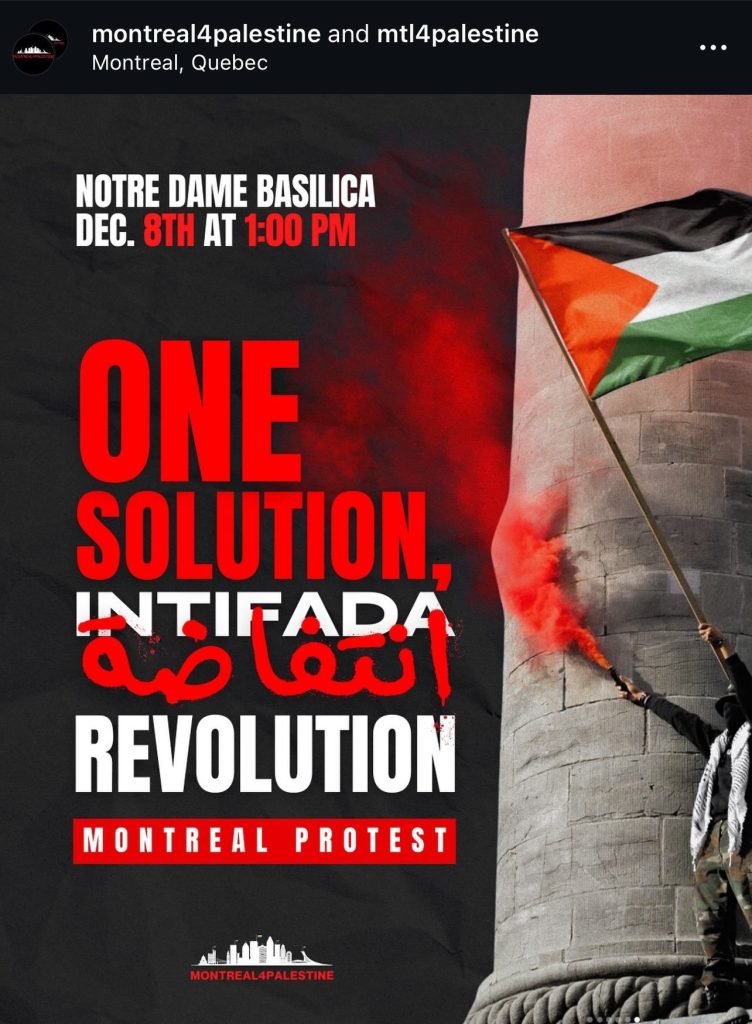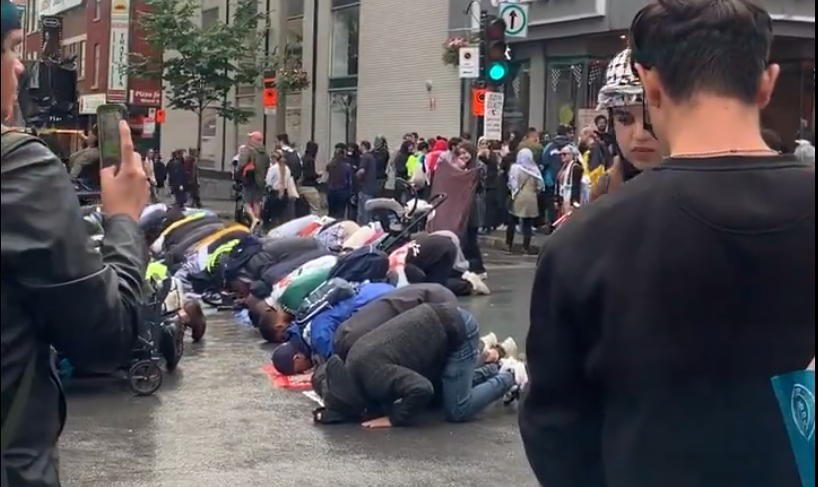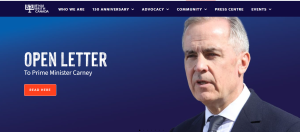The sight of Muslim men kneeling on the ground in prayer on city streets, often during pro-Palestinian demonstrations and sometimes blocking traffic, all while being shielded by Montreal police (SPVM) officers, has reached its limit, according to Quebec Premier François Legault.
“I see people on their knees in the street praying,” he said. “I don’t think it’s something we want to have here.”
Asked if he would legislate against it, he replied, “It’s what we’re looking at,” and has mused about using section 33 of the Canadian Charter of Rights and Freedoms—the notwithstanding clause—to do so.
At a Dec. 6 scrum capping a parliamentary session rife with debates, scandals and revelations about religious school funding, intrusion of religion in Quebec public schools, the launch of 17 school investigations and students praying in Laval high school classrooms, Legault told reporters that he and his government intend to “send a very clear message to the Islamists… We’re going to fight, and we’re never going to accept that people try not to respect Quebec’s fundamental values” of secularism and gender equality.
The topic is an especially sensitive one in Montreal. The administration of Mayor Valérie Plante has included Islamophobia in condemnations of antisemitism, regardless of context; Plante has also referred to a firebombed synagogue as a mosque, and elected officials have repeated Plante’s familiar refrain that Montreal is “a city of peace.” Her point person for public security, Alain Vaillancourt, did not respond to queries from The CJN.
The CJN asked Montreal police how many infractions, if any, have been issued to individuals or groups obstructing traffic to engage in street prayer during the nearly 400 demonstrations over the last 14 months. There has been no official or public confirmation of how many traffic-blocking prayer incidents have occurred. (The CJN has tallied seven.)
The SPVM is facing mounting criticism over a conspicuously lax approach to raucous protests, including permitting demonstrators to violate a Quebec court injunction outside a synagogue on Nov. 5 and asking Jews and other citizens to vacate the public domain to avoid incitement of protesters. “There is no law or bylaw prohibiting public prayer on the island of Montreal,” they said, adding that police “adapt operations according to the context of each situation, taking into consideration the safety of all.”
Rabbi Reuben Poupko of Montreal’s Beth Israel Beth Aaron Congregation told The CJN, “When it comes to conflict in Montreal between law and order and peace, police often choose peace, and that leaves our community feeling exposed.”
Montreal Police Brotherhood president Yves Francoeur could not say how many incidents have occurred, confirming to French-language radio that activities blocking traffic are subject to the Highway Safety Code. “We have the power to ask them to stop, to move, to free up the road. If they persist, we have the right to arrest them,” he said. He reiterated that the union was among the first organizations to support Bill 21, Quebec’s secularism law, noting street prayer “doesn’t have its place in Montreal; it doesn’t have its place in Quebec.”
Liberal MNA André Morin is the Official Opposition’s critic for immigration, integration, secularism and justice, and suggested Legault is trying to deflect and distract Quebecers from a “difficult session” and the CAQ government’s record $11-billion deficit.
“He hasn’t yet adequately explained exactly what the problem is that he’s trying to fix,” he told The CJN. “Religion is not illegal in Quebec and is protected by the Canadian and Quebec Charters. For a premier to say we need to forbid prayer in public spaces is a big statement and a big step.”
Morin says there’s already a wide range of legislation applying to street prayer, including the Quebec Highway Code and municipal bylaws. “But we have to be careful. Yes, there is an Islamist movement in Quebec, a political ideology, but not all Muslims are part of that.”
The Jewish Community Council of Montreal did not respond to The CJN’s request for comment, but the Centre for Israel and Jewish Affairs (CIJA) posted on social media, “It is not acceptable to see our public spaces privatized by groups of radical militants praying for the martyrs of Islamic terrorist groups and the death of Zionists. We salute Premier François Legault for his leadership.” CIJA said it will work with partners and the government “to arrive at legislation that will put an end to this assault on our common Quebec values.”
Legault sounded adamant. “When we want to pray, we go to a church, to a mosque, but not to public places,” he said, his salvo coming three days after a pro-Palestine group called for a rally in support of “One Solution, Intifada Revolution” at Montreal’s famed Notre Dame Basilica on the day marking Solemnity of the Immaculate Conception.

That Dec. 8 rally, attended by several dozen demonstrators, saw a few dozen men kneeling and praying in unison without incident, while others walked around with flags, some masked. A few people stood across from them in front of the church in opposition to the protest. At least one was reportedly asked to move by Montreal police, but The CJN could not confirm that.
On the federal side, the reaction was swift, with Immigration Minister Marc Miller suggesting Legault is picking on Muslims, and Justice Minister Arif Virani cautioning Legault about using the notwithstanding clause to override Canadians’ rights.
There are also questions if such a move can potentially prevent Jews from holding outdoor Shabbat celebrations, block men from gathering to put on tefillin, and ban menorah lightings, already facing restrictions in some Canadian municipalities.
“Most people agree that if the Quebec government comes out with any legislation, it will be targeted towards the context that is most problematic,” for example, street demonstrations and traffic blocking incidents, said Rabbi Poupko, adding Jews faced a similar quandary when the government started talking about Bill 21, which banned the wearing of religious symbols by many public employees. “We all know where this is coming from and the context,” he said. “The target of this legislation is not the Jewish community. We know that we are collateral damage in this.”
Rabbi Poupko says when streets are blocked by protesters praying, it is being used as a political tool. “Everyone understands these impromptu prayer services are not done as pious acts of devotion. It’s an attempt to intimidate, to express a form of Islamist supremacism, and when you weaponize prayer, this is the consequence. The radicals have weaponized prayer to disrupt, to demonstrate power.
“I can’t have a picnic in the street, but that doesn’t mean that the government is trying to starve me. I can go eat at home. And it’s not an infringement on someone’s freedom of expression or freedom of religion not to be allowed to pray in the street.” Banning this activity from public streets is not an act of discrimination or anti–freedom of expression, he says. “It’s pro-traffic.”
The Canadian Civil Liberties Association has expressed alarm about the increased use of the notwithstanding clause by all governments, including Legault’s intentions, and has launched a campaign to alert Canadians to the dangers posed to the Charter by its repeated use and suggested more robust and stringent guardrails for its use.
Quebec’s bishops are concerned about the erasure of people and communities of faith from Quebec’s public spaces. Assembly of Quebec Catholic Bishops president Mgr Martin Laliberté said such a prohibition would be unenforceable and “off the mark in promoting peaceful co-existence in a secular state.”
If a religious group gathers for purposes other than prayer, “Will we then try to ensure that no prayers are recited during a food drive or before a friendly meal? How can we identify a prayer, and above all, why would we try to do so? Praying is not dangerous.”
Indeed, says Liberal critic Morin, “If you’re just praying in the park, is that something the Premier of Quebec will forbid? What François Legault is trying to do is very difficult, but it’s on him to explain.”
Laliberté noted that practices targeted by such a prohibition are not all public actions of religious people, but those of minority religious groups “perceived as different, and, for this reason, threatening to Quebec identity.” He said the rights involved are recognized by the Universal Declaration of Human Rights, Article 18: “Freedom to manifest his religion or belief, alone or in community with others, in public or in private, in teaching, practice, worship and observance… it is essential to act with great caution, in order to respect the rights and dignity of all people.”
During the Bill 21 debates, Poupko says many people were willing to “’take the hit’, while others were standing on principle and said we can’t tolerate anyone taking away any rights.” Even if damage wasn’t so grave from Bill 21, he says, “it’s cold comfort for those who want to stand on principle. I really get that.”
But he’s confident any legislation will address behaviour to focus on “prayer that obstructs,” and was quick to add that “Jews don’t obstruct traffic to pray—at most we’ll go to the park for tashlikh for a few minutes, and we’re not talking here about a guy standing in the corner of an airport. Jews praying never obstruct traffic, unless you count the aisle on an El Al flight.”
The National Council of Canadian Muslims posted: “Imagine living in a country where the government can come after you for clasping your hands and praying for a loved one in a hospital waiting room. This is extremely concerning! The time is fast approaching when Canadians will be forced to grapple with the weakness of our charter rights and look for ways to protect ourselves from liberticidal government overreach. As we await the promised legislation, we will be consulting with communities across the country and preparing to stand up for the rights of all Canadians.”
Imam Adil Charkaoui of Montreal, who publicly called for the death of Zionists and enemies of Gaza a few weeks after the Oct. 7, 2023 Hamas terrorist attack in Israel—but ultimately faced no charges owing to religious exceptions to hate speech in Canada’s Criminal Code—dismissed Legault’s comments. Muslims don’t need anybody’s permission to pray, he stated on social media. It is a right protected by Quebec and Canadian Charters and conferred by Islamic scripture: “The whole earth has been offered to me as a place of prayer and as a means of purification. So anyone in my community at the time of prayer can perform it wherever he is.”
Author

Joel has spent his entire adult life scribbling. For two decades, he freelanced for more than a dozen North American and European trade publications, writing on home decor, HR, agriculture, defense technologies and more. Having lived at 14 addresses in and around Greater Montreal, for 17 years he worked as reporter for a local community newspaper, covering the education, political and municipal beats in seven cities and boroughs. He loves to bike, swim, watch NBA and kvetch about politics.
View all posts








